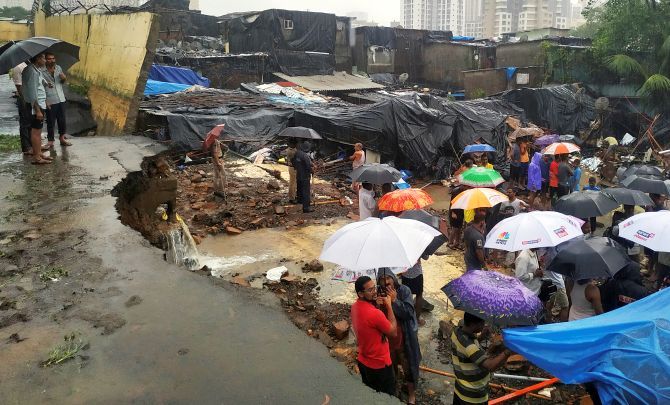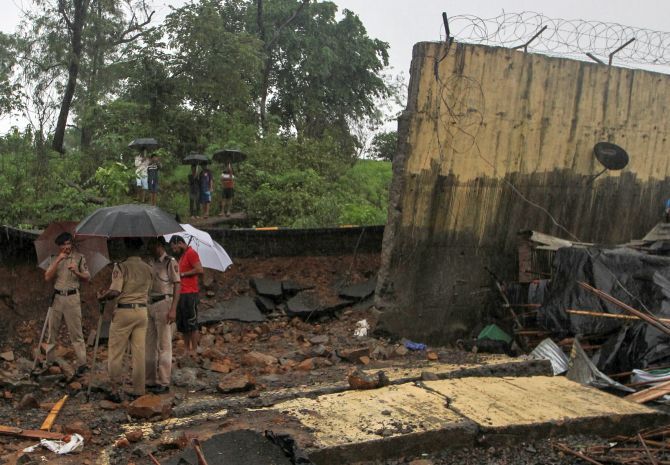The injured -- 130 -- cannot go back to work nor do they have homes to return to.
Many of them refuse to leave the hospital while some of their relatives sleep in the hospital corridors.
Apart from their physical injuries, the trauma of seeing their family members swept away haunts them as does the loss of all their possessions.
But the BJP-Sena government remains indifferent to this human crisis.
Jyoti Punwani reports.

Had the BrihanMumbai Municipal Corporation followed high court orders 22 years ago, 29 Mumbaikars would not have lost their lives when the Malad reservoir wall collapsed on the midnight of July 1.
Some of these victims paid with their lives for a criminal act committed by the authorities long before they were born.
This revelation is part of the interim fact-finding report issued on the Malad disaster by Bilal Khan of the Ghar Bachao Ghar Banao Andolan, Hussain Indorewala, urban researcher, and other activists and students.
The report was released on Wednesday, July 10, in the presence of some of the affected slum-dwellers.
On May 7, 1997, says the report, Justices M B Shah and F J Rebello of the Bombay high court ordered the BMC to resettle the families living on the 46-acre settlement before demolishing their homes.
An NGO dealing with the environment had filed a petition asking for demolition of hutments, which were on forest land under the Sanjay Gandhi National Park.
The slum dwellers had filed another petition asserting their rights to housing and livelihood.
Ambedkar Nagar and Pimpriwada, the slum colonies affected by the wall collapse, are part of this settlement.
The court set an 18-month deadline for the resettlement and ordered the BMC to provide basic services of water and electricity to the residents till they were rehabilitated.
It also ordered the slum dwellers to pay Rs 7,000 as rehabilitation fee, which many of them did.
But the BMC ignored these directions and carried out two demolitions in 1999 and 2000.
It also denied the slum dwellers basic amenities such as water and electricity till recently.
The settlements still have no drainage system and no pucca road.

That's not all.
The wall that collapsed which separates the BMC's Malad reservoir from the slums, was designed wrongly, the report has found.
The design did not take into account the need for an outlet for water, Water would accumulate at the base of the wall without being able to flow out.
It filtered into the soil and weakened the wall's foundations.
The hutments were on a slope downhill from the reservoir.
This crucial fact was also ignored when building the wall.
During the heavy rains, the storm run-off due to the topography of the site was blocked by the wall, and the existing drainage outlets proved insufficient.
The wall itself had no outlets to allow surface run off, which would have released the pressure of the water accumulated behind it.
On the midnight of July 1, the wall breached at two places thanks to the heavy rains.
Six years ago too, the settlements had experienced heavy flooding.
Both these facts: The government's refusal to follow the high court's directions and its negligence in letting the contractor build a wall with a faulty design, make the July 1 wall collapse a man-made disaster that could have been prevented, concludes the report.
In 1997, incidentally, the same ruling alliance of the Shiv Sena and the Bharatiya Janata Party was in power, and the Sena controlled the BMC.
The Sena has controlled the BMC since then.
However, nothing prevented the Congress-Nationalist Congress Party coalition that ruled Maharashtra from 1999 to 2014, from settling these slum dwellers elsewhere.

Now, after 29 slum dwellers were swept to their deaths by the overflowing reservoir, the BMC has decided to resettle the slum dwellers.
Even this belated move would have been welcome, had the government and the BMC not displayed their malafides by issuing orders to settle them in the SRA township at Mahul, north east Mumbai.
The report points out that the National Green Tribunal declared Mahul 'unfit for human habitation' four years ago.
This finding has been confirmed by the KEM Hospital, Mumbai, and IIT-Bombay.
Mahul is also far away from Malad.
There are vacant flats available in Kandivli, much closer, but the authorities refuse to consider this alternative.
The report does not say why, but it is clear that the BJP and the Sena that rule both he government and the BMC, view this disaster as an opportunity to push the helpless victims into buildings which have been abandoned by those they were meant for: Project Affected Persons.
The Bombay high court has already ruled that those Project Affected Persons cannot be forced to live in those buildings, and directed the government to pay them rent so that they can live elsewhere.
But like it had in 1997, the BJP-Sena ruling coalition has ignored this order too.
The Mahul residents who moved court are still living in the open, more than eight months after they first left the death traps that the government had built for them in the form of a cluster of buildings in one of Mumbai's most polluted areas.
The report also faults the government's response immediately after the disaster.
The BMC's disaster management unit could have helped ease the Malad slum dwellers suffering.
It could have issued a warning given the record-breaking rain that was seen on July 1.
It could have immediately sent personnel to rescue slum dwellers trapped under their collapsed homes and carry them to the ambulances.
The ambulances were forced to wait some distance away as the kutcha road had been washed away and the ambulances could not drive through the sludge all around.
The nearest public hospital is 6 km away.

As always happens, the slum-dwellers were left to themselves.
They had to claw through the debris to hunt for their family members, and take the injured to hospitals on their motorbikes, as autorickshaws were unwilling to do so.
The BMC's 'Flood Preparedness Guidelines' show Malad's slums as vulnerable.
These guidelines mandate that the BMC must be on alert during heavy rains, ready to rescue vulnerable populations.
The report brings out the terrible situation at the site today.
About 140 to 160 houses in Ambedkar Nagar and 65 in Pimpriwada were completely destroyed; and 80 to 95 houses flooded.
The slum dwellers are unwilling to leave the ruins of their homes, in case the government conducts a survey there and they are left out.
The injured -- 130 -- cannot go back to work nor do they have homes to return to.
Many of them refuse to leave the hospital while some of their relatives sleep in the hospital corridors.
Apart from their physical injuries, the trauma of seeing their family members swept away haunts them as does the loss of all their possessions, including precious documents required to make them eligible for rehabilitation.
But the government remains indifferent to this, as it has to their immediate needs for food, shelter, clothes and transport.
NGOs are providing these.
The new academic year had just started; but children have been sent to relatives's homes.
They are not just out of school for an indefinite period, they have also lost their books.
The Malad wall collapse was one more State-made disaster in the urbs prima of the country that will leave its victims scarred forever.










